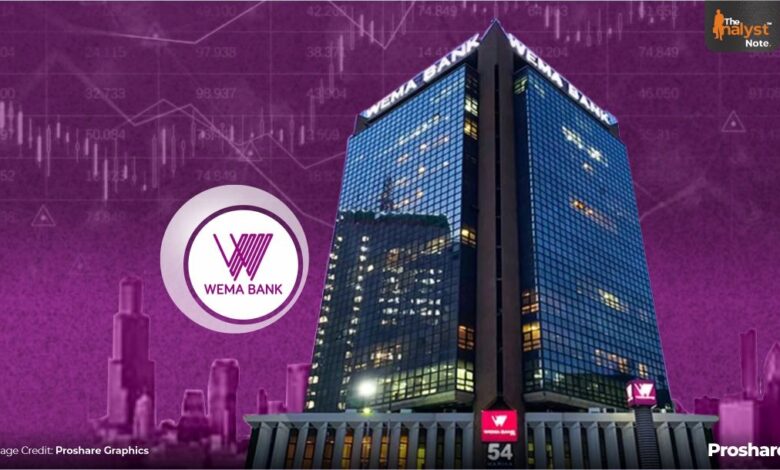Wema Bank’s Dramatic Turnaround :Tinubu’s or Leadership Factor?

President Bola Ahmed Tinubu’s alleged connection to Wema Bank has sparked intense debate, with some claiming he’s a major stakeholder behind the bank’s remarkable turnaround, while others attribute its success to visionary leadership. As Wema Bank celebrates its 80th anniversary, marked by impressive financial performance and technological innovation, questions linger about the driving forces behind its resurgence. Tinubu has publicly praised Wema Bank’s resilience and innovation, but the nature of his involvement remains unclear. Is it a case of strategic leadership or influential backing that’s propelled Wema Bank to new heights?
Whether Tinubu is the reason behind the bank sudden and dramatic change of Wema Bank’s fortune or not is a case to be treated another day when a concrete is available . For now, what can not be disputed is that Wema Bank”s strategic position has changed dramatically . In today’s fast-paced banking industry, companies that effectively leverage their strategic position can achieve remarkable success. By conducting a thorough SWOT analysis, identifying strengths, weaknesses, opportunities, and threats, banks can unlock pathways to competitiveness and growth. One notable example in the recent time is Wema Bank . The bank has dramatically transformed its fortunes by capitalizing on its strengths, addressing weaknesses, seizing opportunities, and mitigating threats. Through bold strategic moves, this bank has positioned itself for sustained growth, digital expansion, and enhanced lending capacity, setting a new benchmark for success in Nigeria’s banking sector.
Wema Bank’s strategic position has undergone a dramatic transformation, exemplifying a remarkable shift in its trajectory. The bank’s bold move to raise ₦50 billion through a private placement, coupled with its earlier ₦150 billion rights issue, has catapulted its total qualifying capital to ₦264.87 billion, exceeding the Central Bank of Nigeria’s minimum requirement of ₦200 billion. This strategic maneuver has not only fortified Wema Bank’s balance sheet but also positioned it for sustained growth, digital expansion, and enhanced lending capacity. The bank’s proactive approach to capital management has earned it a competitive advantage, setting it apart from peers still grappling with recapitalization efforts. With its robust financial performance, including a 229% surge in pre-tax profit, Wema Bank’s transformation embodies a masterclass in strategic agility, poised to capitalize on emerging opportunities and solidify its market leadership
Wema Bank has emerged as a powerhouse in Nigeria’s tier 2 banking space, driven by a strategic shift that has yielded impressive results. With a strong focus on digital innovation, cost discipline, and operational efficiency, the bank has delivered a solid performance that defies market expectations, posting a profit before tax of N100.60 billion in H1 2025 and outpacing peers in profitability and valuation metrics.
Strong Leadership Qualities
Wema Bank’s leadership qualities have been instrumental in driving the bank’s outstanding performance. The team’s ability to anticipate market trends, regulatory changes, and customer needs has enabled Wema Bank to stay ahead of the curve, making informed decisions that position the bank for long-term success. This foresight allows them to navigate complex challenges and capitalize on emerging opportunities.
The bank’s leadership has demonstrated a keen ability to design and implement a robust strategic framework that aligns with its vision and goals. This strategic architecture enables Wema Bank to build a strong foundation for growth and profitability, ensuring that all aspects of the organization are working towards a common objective.
Wema Bank’s leadership has shown a willingness to push beyond conventional boundaries, setting ambitious targets and driving innovation to achieve them. This mindset enables the bank to outperform its peers and achieve remarkable results, fostering a culture of continuous improvement and excellence.
The leadership team has effectively leveraged the bank’s strengths, resources, and partnerships to drive growth and profitability. By identifying opportunities to maximize its impact, Wema Bank has been able to deliver strong financial results, drive innovation, and build a sustainable competitive advantage. This ability to leverage its assets has been crucial in achieving outstanding performance and positioning the bank for long-term success.
Strategic Choices.
Wema Bank’s meteoric rise to becoming a formidable force in Nigeria’s tier 2 banking space is a testament to its strategic choices, including a relentless focus on digital innovation, rigorous cost discipline, and a commitment to operational efficiency, which have collectively propelled the bank’s profitability, asset quality, and market valuation to new heights, delivering a profit before tax of N100.60 billion in H1 2025 and outshining its peers.
Strategic Actions
Wema Bank’s strategic position as a leader in Nigeria’s tier 2 banking space is a direct result of its bold and innovative actions, including launching groundbreaking digital platforms like ALAT, implementing robust risk management structures, and fostering a culture of financial discipline and operational resilience. Under the leadership of visionaries like Moruf Oseni, Ademola Adebise, and Segun Oloketuyi, the bank has consistently transformed to meet evolving customer needs, driving growth and profitability. Key initiatives such as CoopHub, a digital platform for cooperative societies, and SARA by Wema, empowering women-led businesses, have further solidified Wema Bank’s position as a trailblazer in the industry. The bank’s commitment to environmental sustainability, inclusive leadership, and digital governance has earned it ratings upgrades from Fitch and GCR, affirming its long-term strategy and operational resilience .
Strong Fundamentals
.Wema Bank’s Stellar Performance: A Deeper Dive into its Financials
Wema Bank’s recent financial performance has been nothing short of impressive, with the bank delivering strong growth in assets, profitability, and efficiency. Let’s take a closer look at the bank’s financials to understand the drivers of its success.
Asset Quality and Growth
Wema Bank’s total assets grew by 46.46% to N3.97 trillion in H1 2025, driven primarily by a 46.46% increase in loans and advances to customers and a 74.83% growth in investment securities. This significant expansion in assets is a testament to the bank’s ability to identify and capitalize on growth opportunities.
Liquidity
The bank’s cash and cash equivalents declined by 11.86% from N267.31 billion in H1 2024 to N235.62 billion in H1 2025. While this decline may raise some concerns about liquidity, it’s worth noting that the bank’s overall liquidity position remains strong, with a loan-to-deposit ratio that is not explicitly stated but can be inferred to be manageable given the bank’s growth trajectory.
Capital Adequacy
Wema Bank’s retained earnings grew by 198.40%, fueling a 62.67% increase in shareholders’ funds to N323.12 billion. This significant growth in capital adequacy is a strong indicator of the bank’s financial stability and its ability to absorb potential losses.
Deposits Growth
Although the article doesn’t provide explicit details on deposit growth, the bank’s ability to grow its assets and loans suggests that deposits have likely increased. Wema Bank’s shift away from expensive time deposits, as mentioned in the Fitch Ratings report, is a strategic move that could help improve its net interest margin and reduce funding costs.
Profitability
Wema Bank’s profit before tax of N100.60 billion in H1 2025 is a remarkable achievement, especially considering that it outperformed its peers FCMB and Sterling Holdings. The bank’s strong cost discipline and operational efficiency are reflected in its lowest cost-to-income ratio of 47.56% among its peers.
Profitability Ratios
The bank’s net interest margin rose to 4.98%, indicating its ability to generate income from its core lending activities. The return on equity (ROE) is not explicitly stated, but the bank’s impressive profit growth suggests that ROE has likely improved.
Price-to-Earnings Ratio and Valuation
Wema Bank’s price-to-earnings ratio declined to 1.83x in H1 2025 from 2.94x in H1 2024, implying that the stock may be underpriced. The price-to-book ratio rose from 0.78x in H1 2024 to 0.99x in H1 2025, indicating that the stock is trading close to its book value.
In conclusion, Wema Bank’s financial performance in H1 2025 is a testament to its strong business model, efficient operations, and strategic decision-making. The bank’s growth trajectory, coupled with its improving profitability and efficiency metrics, positions it as a compelling play among Nigeria’s tier 2 banks. As the operating environment evolves, Wema Bank’s agility, asset quality, and revenue diversification will be critical in sustaining its momentum.
Wema Bank’s Rating Upgrades: A Reflection of its Strong Financial Performance
Wema Bank has received upgrades from prominent credit rating agencies, Fitch and GCR, with Fitch upgrading its National Long-Term Rating to ‘A-(nga)’ from ‘BBB(nga)’ and revising its outlook to Positive. GCR also upgraded the bank’s National Scale Long and Short-Term Issuer Ratings to BBB+(NG)/A2(NG) from BBB(NG)/A3(NG), maintaining a Stable Outlook.
Fitch’s upgrade reflects Wema Bank’s improved financial stability and stronger growth outlook. The Positive outlook indicates the agency’s confidence in the bank’s ability to sustain its growth momentum. GCR’s upgrade is a testament to Wema Bank’s 80-year legacy of resilience, excellence, and trust. The Stable Outlook suggests that the bank’s financial performance is expected to remain stable in the short term. Agusto & Co upgraded Wema Bank’s rating to “A-” from “Bbb+”, reaffirming a stable outlook. This upgrade is underpinned by the bank’s fast-improving business risk profile, better profitability, improved operating efficiency, good liquidity profile, and strong shareholders’ support.
The rating upgrades are likely to increase investor confidence in Wema Bank, making it more attractive to investors and potentially leading to increased investment. The upgrades position Wema Bank as a key player in Nigeria’s banking industry, reflecting its strong financial performance and growth prospects. The Positive and Stable outlooks suggest that Wema Bank is well-positioned for long-term sustainability, with a strong capacity to meet its obligations and deliver value to stakeholders.
Wema Bank’s Managing Director/CEO, Moruf Oseni, expressed appreciation for the rating upgrades, reiterating the bank’s commitment to delivering value to customers and shareholders. He emphasized that Wema Bank’s journey is just beginning, with a strong legacy of impact, resilience, empowerment, innovation, and excellence.
RECENT SHARE PRICE MOVEMENTS
Wema Bank’s share price has shown a remarkable surge over the past year, with a year-to-date increase of 141% and a one-year gain of 240%. The bank’s current share price stands at ₦22.00. Wema Bank’s share price experienced a notable upward trend from ₦9.10 on January 2, 2025, to ₦22.00 on July 31, 2025, representing a 141.76% increase over the seven months.
The stock has a 52-week range of ₦6.00 to ₦24.80, with a 52-week low of ₦6.00 on August 16, 2024, and a 52-week high of ₦24.80 on August 5, 2025. The price trajectory reflected improved investor sentiment, earnings momentum, and potentially strategic market positioning by the bank. Analysts believe the share price movement reflects speculative activity in a growth stock, as indicated by the rising EPS and ROE.
The bank’s strong financial performance, driven by aggressive asset re-pricing and increased lending activity, has contributed to its impressive share price growth. Wema Bank’s price-to-earnings ratio declined to 1.83x in H1 2025 from 2.94x in H1 2024, implying the stock was underpriced. Overall, Wema Bank’s share price movement suggests a mix of short-term correction and long-term growth potential, driven by the bank’s strong financial performance and growth prospects
WEMA AND ITS PEERS
.Wema Bank’s peer analysis reveals a strong performance compared to its peers in the Nigerian banking industry. The bank’s price-to-earnings (P/E) ratio of 1.83x is lower than the peer average, indicating that the stock may be undervalued compared to its peers.
Wema Bank led the list of best-performing banks in Nigeria in 2024, with notable improvements in profitability, cost efficiency, deposit mobilization, capital base increase, and performing loans. The bank’s asset growth was impressive, with a 46.46% increase to N3.97 trillion in H1 2025, driven by increased loans to customers and investment securities.
In a comparative review of tier 2 banks’ H1 2025 performance, Wema Bank stood out, delivering significant profitability and efficiency metrics relative to its peers. Despite recording lower gross earnings than FCMB, Wema achieved the highest profit before tax of N100.60 billion, outperforming both FCMB and Sterling Holdings. This reflects strong cost discipline and operational efficiency, further reinforced by its lowest cost-to-income ratio of 47.56%.
Overall, Wema Bank’s peer analysis suggests that the bank is a strong performer in the Nigerian banking industry, with a solid track record of growth, profitability, and efficiency.
FUTURE PROSPECTS
Wema Bank’s future prospects appear bright, driven by its strong financial performance, strategic initiatives, and commitment to innovation. The bank’s vision to become a Systemically Important Bank (SIB) in Nigeria is supported by its recent N150 billion rights issue, aimed at consolidating its capital base and expanding its lending capacity.
Wema Bank is leveraging Artificial Intelligence (AI) to enhance customer experiences, improve operational efficiency, and drive innovation. The bank’s digital banking platform, ALAT, has played a critical role in increasing its market reach, particularly among younger, tech-savvy Nigerians. Wema Bank is also fostering collaborations with technology partners, fintech startups, and academic institutions to drive innovation and support its digital transformation goals.
The bank is committed to fostering inclusion and supporting community development across Nigeria, as evident in its partnership with the Enterprise Development Centre (EDC) and Mastercard to train 50,000 women. Wema Bank’s focus on sustainable growth is reflected in its commitment to environmental, social, and governance (ESG) goals, including adopting energy-efficient AI infrastructure and minimizing the carbon footprint of AI operations.
Recent rating upgrades from prominent agencies, including Fitch, GCR, and Agusto & Co, reflect Wema Bank’s improving business risk profile, driven by sustainable profitability, operating efficiency, good liquidity, and strong shareholder support. These upgrades position Wema Bank as a key player in the Nigerian banking industry, with a stable outlook indicating confidence in the bank’s ability to meet its obligations.
Wema Bank’s future prospects are promising, driven by its strong financial performance, strategic initiatives, and commitment to innovation. The bank’s leadership in AI adoption positions it as a model for other institutions looking to harness the power of AI to drive digital transformation. As the banking industry continues to evolve, Wema Bank’s agility, asset quality, and revenue diversification will be critical in sustaining its momentum and achieving long-term success.




